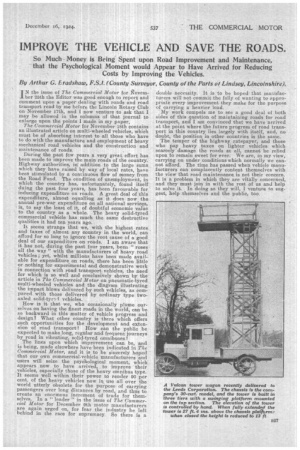IMPROVE THE VEHICLE AND SAVE THE ROADS.
Page 11

If you've noticed an error in this article please click here to report it so we can fix it.
So Much Money is Being Spent upon Road Improvement and Maintenance, that the Psychological Moment would Appear to Have Arrived for Reducing Costs by Improving the Vehicles.
By Arthur G. Eradshow, F.S.I. (County Surveyor, County of the Parts of Lindsey, Lincolnshire),
1-N the issue of The Commercial Motor for govern
ber 25th the Editor was good enough to report and comment upon a paper dealing with roads and road transport read by me before the Lincoln Rotary Club on November 17th, and I now venture to ask that I may be allowed in the columns of that journal to enlarge upon the points 1 made in my paper.
The Commercial Motor for November lath contains an illustrated article on multi-wheeled vehicles which must be of absorbing interest to all those wlio have to do with the manufacture and employment of heavy mechanical road vehicles and the construction and maintenance of roads.
During the past few years a very great effort has been made to improve the main roads of the country. Highway authorities, in addition to the large sums which they have raised by way of local rates, have been stimulated by a continuous flow of money from the Road Fund. The condition of unemployment, in which the country has, unfortunately, found itself duing the past four years, has been favourable for inducing expenditure on roads. A great deal of this expenditure, almost equalling as it does now the annual pre-war expenditure on all national services, is, to say the least ot. it, of doubtful economic value to the country as a whole. The heavy solid-tyred commercial vehicle has much the same destructive qualities it had ten years ago.
It seems strange that we, with the highest rates and taxes of almost any country in the world, can afford for so long to ignore the root cause of a good deal of our expenditure on roads. I am aware that it has not, during the past four years, been " roses all the way" with the manufacturers of heavy road vehicles; yet, whilst millions have been made available for expenditure on roads, there has been little or nothing for experimental and demonstrative work in connection with road transport vehicles, the need for which is so well and conclusively shown by the article in The Commercial Motor on pneumatic-tyred multi-wheeled vehicles and the diagram illustrating the impact blows delivered by such vehicles, as compared with those delivered by ordinary type twoaxled solid-tyr--1 vehicles.
How is it that we, who occasionally plume ourselves on having the finest roads in the world, can be so backward in this matter of vehicle progress and design? What other country is there which offers such opportunities for the development and extension of road transport? How can the public be expected to make long, regular and frequent journeys by road in vibrating, solid-tyred omnibuses?
The lines upon which improvement can be, and is being, made elsewhere have been indicated in The Commercial Motor, and it is to be sincerely hoped that our own commercial-vehicle manufacturers and users will seize the psychological moment, which appears now to have arrived, to improve their vehicles, especially those of the heavy omnibus type. It seems well within their power to render 90 per cent, of the heavy vehicles now in use all over the world utterly 'obsolete for the purpose of carrying passengers over long distances by road, and thus to create an enormous increment of trade for themselves. In a " leader" in the issue of The Commercial Motor for December 9th motor manufacturers are again urged on, for fear the industry be left behind in the race for supremacy. So there is a
double necessity. It is to be hoped that manufacturers will not commit the folly of wanting to appropriate every improvement they make for the purpose of carrying a heavier load. My work compels me to see a good deal of both sides of this question of maintaining roads for road transport, and I am convinced that we have arrived at the point where the future progress of road transport in this country lies largely with itself, and, no doubt, the position in other countries is the same.
The temper of the highway. ratepayer, and those who pay heavy taxes on lighter vehicles which scarcely damage the roads at all, cannot be relied upon to remain sweet for ever. We are, in my view, carrying on under conditions which normally we cannot afford. The time.has passed when vehicle manufacturers can complacently content themselves with the view that road maintenance is not their concern. It is a problem in which they are vitally concerned, and they must join in with the rest of us and help to solve it. In doing so they will, I venture to suggest, help themselves and the public, too.






























